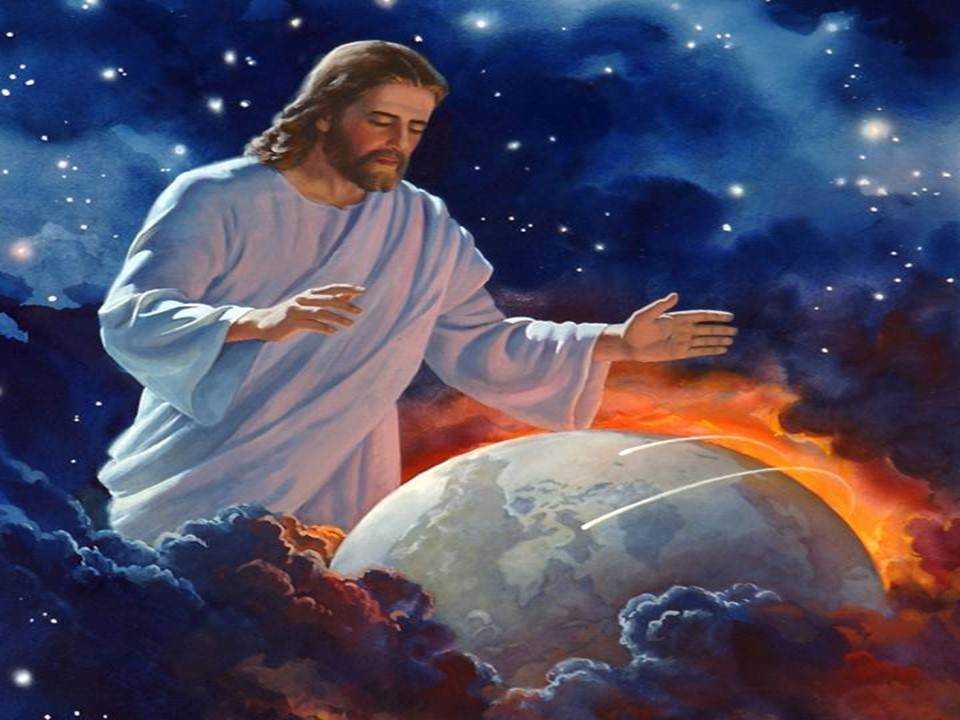
God the Son

Samuel Smith
23 Jan'19
5
LESSON 3
GOD THE SON
You are welcome to another edition of Insights from God's Word, a Bible study programme that is committed to sharing God's Word by allowing the Bible to speak for itself.In this edition, we continue with our series on The Godhead. The topic for this study is: God the Son. In this study, we will consider in detail what the Bible says in relation to the Son.
The Scripture makes it clear that the Son is separate from the Father and the Holy Spirit (see
1) THE DIVINITY OF CHRIST AS REVEALED IN THE OLD TESTAMENT
Some of the clear passages that show the divinity of the Son in the Old Testament are as follows:i) "I, even I, am the LORD (Jehovah); and beside me there is no saviour" (
In our previous study on the Godhead, we noted how the name Jehovah was shared by the Father, the Son, and the Holy Spirit in
a) "And we have seen and do testify that the Father sent the Son to be the Saviour of the world" (
b) "For unto you is born this day in the city of David a Saviour, which is Christ the Lord" (
c) "To Titus, mine own son after the common faith: Grace, mercy, and peace, from God the Father and the Lord Jesus Christ our Saviour" (
d) "Simon Peter, a servant and an apostle of Jesus Christ, to them that have obtained like precious faith with us through the righteousness of God and our Saviour Jesus Christ" (
e) "But grow in grace, and in the knowledge of our Lord and Saviour Jesus Christ. To him be glory both now and for ever. Amen" (
f) "For this is good and acceptable in the sight of God our Saviour" (
g) "To the only wise God our Saviour, be glory and majesty, dominion and power, both now and ever. Amen" (
h) "For therefore we both labour and suffer reproach, because we trust in the living God, who is the Saviour of all men, specially of those that believe" (
Friends, these texts clearly come to support the Old Testament text in
ii) In relation to the place of His birth, the prophet Malachi prophesied the following about the Son: "But thou, Bethlehem Ephratah, though thou be little among the thousands of Judah, yet out of thee shall he come forth unto me that is to be ruler in Israel; WHOSE GOINGS FORTH HAVE BEEN FROM OF OLD, FROM EVERLASTING" (
iii) Once again in the Old Testament, the prophet Isaiah describes the divinity of Christ in the following grand words: "For unto us a child is born, unto us a son is given: and the government shall be upon his shoulder: and his name shall be called Wonderful, Counsellor, The mighty God, The everlasting Father, The Prince of Peace" (
2) THE DIVINITY OF CHRIST AS REVEALED IN THE NEW TESTAMENT
In the New Testament, the divinity of Christ is expressed in several beautiful passages. Here are some of them:i)
ii) Christ made certain clear statements about His divinity which angered the Jews. From the gospels, we read about such occurrences:
8:57 Then said the Jews unto him, Thou art not yet fifty years old, and hast thou seen Abraham?
8:58 Jesus said unto them, Verily, verily, I say unto you, BEFORE ABRAHAM WAS, I AM.
8:59 Then took they up stones to cast at him: but Jesus hid himself, and went out of the temple, going through the midst of them, and so passed by."
(
10:31 Then the Jews took up stones again to stone him.
10:32 Jesus answered them, Many good works have I shewed you from my Father; for which of those works do ye stone me?
10:33 The Jews answered him, saying, For a good work we stone thee not; but for blasphemy; AND BECAUSE THAT THOU, BEING A MAN, MAKEST THYSELF GOD."
(
iii) In His work here on earth, Christ received worship from His followers, an act of homage that is due only God (see
a) "1 Now when Jesus was born in Bethlehem of Judaea in the days of Herod the king, behold, there came wise men from the east to Jerusalem, 2 Saying, Where is he that is born King of the Jews? for we have seen his star in the east, and are come to worship him" (
b) "Then they that were in the ship came and worshipped him, saying, Of a truth thou art the Son of God" (
c) "And as they went to tell his disciples, behold, Jesus met them, saying, All hail. And they came and held him by the feet, and worshipped him" (
The followers of Jesus worshipped Him because they saw Him to be more than a mere human being. In the gospel of John, one of the apostles by the name of Thomas, wholeheartly declared unto Christ; "my Lord and my God" (
iv) Besides the evidences we have gone through so far, the apostle Paul also provides the following clear information about the divinity of the Son:
1:2 Hath in these last days spoken unto us by his Son, whom he hath appointed heir of all things, by whom also he made the worlds;
1:3 Who being the brightness of his glory, and the express image of his person, and upholding all things by the word of his power, when he had by himself purged our sins, sat down on the right hand of the Majesty on high:
1:4 Being made so much better than the angels, as he hath by inheritance obtained a more excellent name than they.
1:5 For unto which of the angels said he at any time, Thou art my Son, this day have I begotten thee? And again, I will be to him a Father, and he shall be to me a Son?
1:6 And again, when he bringeth in the firstbegotten into the world, he saith, And let all the angels of God worship him.
1:7 And of the angels he saith, Who maketh his angels spirits, and his ministers a flame of fire.
1:8 But unto the Son he saith, Thy throne, O God, is for ever and ever: a sceptre of righteousness is the sceptre of thy kingdom."
(
Friends, from what we have gone through so far, it is clear that the Son of God can be justifiably called God the Son, just as the Father refers to the Son as God (review
1:35 And the angel answered and said unto her, The Holy Ghost shall come upon thee, and the power of the Highest shall overshadow thee: THEREFORE also that holy thing which shall be born of thee shall be called the Son of God."
(
2:6 WHO, BEING IN THE FORM OF GOD, THOUGHT IT NOT ROBBERY TO BE EQUAL WITH GOD:
2:7 But made himself of no reputation, and took upon him the form of a servant, and was made in the likeness of men:
2:8 And being found in fashion as a man, he humbled himself, and became obedient unto death, even the death of the cross.
2:9 Wherefore God also hath highly exalted him, and given him a name which is above every name:
2:10 That at the name of Jesus every knee should bow, of things in heaven, and things in earth, and things under the earth;
2:11 And that every tongue should confess that Jesus Christ is Lord, to the glory of God the Father."
(
3) Beloved, from the various passages of Scripture we have examined so far, it is clear that the Son is equally divine just as the Father. And as a Divine Being, He deserves our reverence and worship just as the Father. Through the power of the Holy Spirit, we must endeavour to develop a meaningful relationship with this God who chose to become our Saviour and Brother. For He says unto each one of us: "Come unto me, all ye that labour and are heavy laden, and I will give you rest" (
Exhortation: From the pen of inspiration, we read the following clear statements about the divinity of Christ:
i) "Christ's words concerning Abraham conveyed to His hearers no deep significance. The Pharisees saw in them only fresh ground for caviling. They retorted with a sneer, as if they would prove Jesus to be a madman, "Thou art not yet fifty years old, and hast Thou seen Abraham?" With solemn dignity Jesus answered, "Verily, verily, I say unto you, Before Abraham was, I Am." Silence fell upon the vast assembly. The name of God, given to Moses to express the idea of the eternal presence, had been claimed as His own by this Galilean Rabbi. He had announced Himself to be the self-existent One, He who had been promised to Israel, "whose goings forth have been from of old, from the days of eternity." Micah 5:2, margin." - (DA 469-470).
ii) "'In him was life; and the life was the light of men' (John 1:4). It is not physical life that is here specified, but immortality, the life which is exclusively the property of God. The Word, who was with God, and who was God, had this life. Physical life is something which each individual receives. It is not eternal or immortal; for God, the life-giver, takes it again. But the life of Christ was unborrowed. No one can take this life from Him. 'I lay it down of myself' (John 10:18), He said. In Him was life, original, unborrowed, underived. This life is not inherent in man. He can possess it only through Christ." - ST April 8, 1897, par. 2 (also 1SM 296-297).
iii) "He [Christ] was equal with God, infinite and omnipotent. He was above all finite requirements." - 12MR 395 (Manuscript #101, 1897).
In our next study, we will continue with our study on God the Son under the topic: The God-Man. We will be examining particularly the mystery of the incarnation and the divine human nature that characterises the Son of God. The Bible Study references for this upcoming study are
Stay blessed and keep shining for King Jesus.
Maranatha!
Powered by White Throne Ministries














